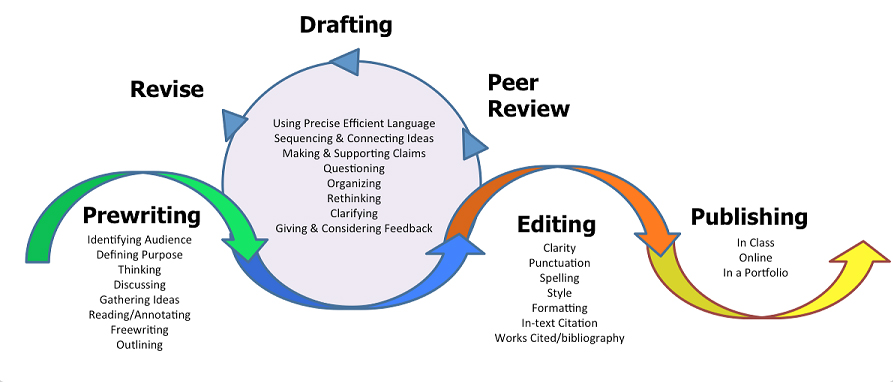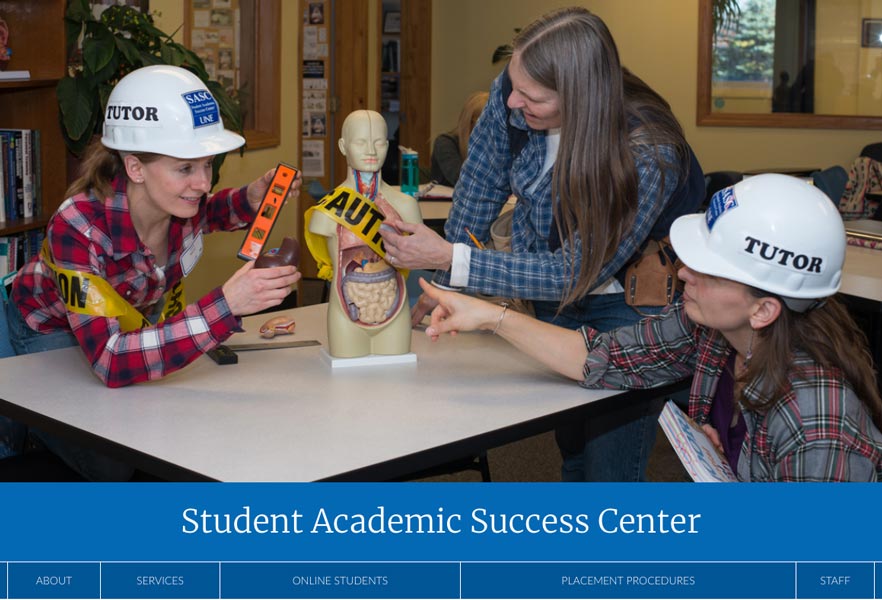How to Write Excellent Graduate-Level Papers
“How to Write Excellent Graduate-Level Papers” brought to you by the Student Academic Success Center (SASC) at UNE.
Becoming a better writer – the process
Breaking a writing project down into phases helps with motivation as well as managing your time and workload effectively. The phases of the process – prewriting, drafting, revision, and editing – are described below. Each step allows you to focus your energy in a particular way, with it all adding up to a more thoughtful, clear piece of writing.
The phases don’t have to be done in a set, linear order, if that’s not effective for you. If you like to write some rough draft paragraphs first, then go back and do a post-draft outline or revise those paragraphs before continuing, that’s fine. The key is to make sure each part of the process is done thoroughly before you consider your paper finished.

Let’s start with using prewriting to get the process rolling:
Prewriting
Using various prewriting strategies can help you avoid procrastinating and start a draft on the right track. You aren’t under pressure to develop a paper yet – this is about unlocking the flow of ideas. Play around with some of these strategies to find ones that work best for you:
- Tap into your curiosity
When you’re faced with an assignment, spend some time simply wondering about the topic. What intrigues you? Why should you and others in your profession care about it? Come up with a couple of relevant questions that you want to explore. Then consider which questions are most meaningful to you personally and professionally—and why? This can be done on paper, in conversation with someone else, or internally.
- Relate the assignment to your profession
Think about why the assignment is important to your field of study and work as a health professional, a social worker, an educator, etc. Making your assignment as personally and professionally relevant as possible helps with generating the motivation to start writing and keeping the momentum through the process. View this as an opportunity to learn useful information.
- Use the assignment itself as an outline
Copy the assignment and paste it into a new document. Break it apart visually by adding line spaces and/or tabs. This will help you more easily identify key concepts which need to be explained and verbs that indicate critical thinking is required (e.g., analyze, compare, evaluate). Create a rough outline using parts of the assignment as headings for different sections of the paper.
Similarly, you could annotate the assignment by marking up the key words and concepts and making little notes in the margins about what to add or how sections or ideas might tie together.
- Leverage what you already know, and then research with a purpose
Another very helpful strategy is to identify key concepts in the assignment description, then brainstorm what you already know about them based on the class readings or videos. Next, make a list of questions you still have about the concepts and overall topic. These will help drive the additional research needed to fill in your gaps of knowledge and locate credible evidence to support your explanations.
Having those questions makes researching more efficient because you have a purpose for reading: you’re looking for pieces of information rather than simply reading articles.
Read more: Faculty Spotlight: Lori Rand, Writing Specialist at SASC
Drafting
The drafting phase involves determining your focus and starting to develop paragraph ideas within a structure. Keep a copy of the assignment on your draft as you write. Clarify the point of your paper – what is the main question that the assignment asking you to answer?
Think of a draft as packaging ideas into paragraphs that all relate to the paper’s main focus, as summed up in the thesis statement. For clarity, try to keep each paragraph focused on one idea at a time. However, because this phase is about getting thoughts down, and thoughts often jump around, drafting tends to be messy. That’s okay! The next step, revision, is where you really improve the writing.
Revision
In this phase, you can work on improving how you are guiding your reader through your thinking. Your reader will understand your ideas more easily if they are clearly focused, well-developed with specific evidence (correctly cited), and nicely organized.
Two strategies to guide you through revision include SASC’s Revision Checklist and Post-draft Outline, found here under Writing Resources. A writing appointment is also a great way to learn about and practice revision skills.
Editing
Editing is the final, polishing phase; it involves correcting sentence-level issues and technical aspects, such as word choice and grammar. Readers pick up these issues quickly because they can be the most obvious. Carelessness with grammar or word choice can lead to misunderstandings and make your writing seem unprofessional.
In addition to reading your paper straight through from beginning to end, you could listen to someone else read your paper out loud, or proofread by working backward, sentence by sentence, starting at the end of a paragraph.
Trust the process
As mentioned earlier, the writing process is not necessarily a linear, step-by-step approach; it’s recursive, so it’s highly likely you’ll move back and forth between phases as you figure out your focus and organization of ideas.
Using this process gets easier with practice, and it works well in any writing situations, not just for graduate school assignments and scholarly papers.
Once you develop the most efficient method for your learning style, not only will you get faster, you will produce better academic papers.
Book an appointment
The SASC can help with all phases of the writing process via an Online Writing Support Appointment. Visit the Online Student page for more details about writing support and resources.